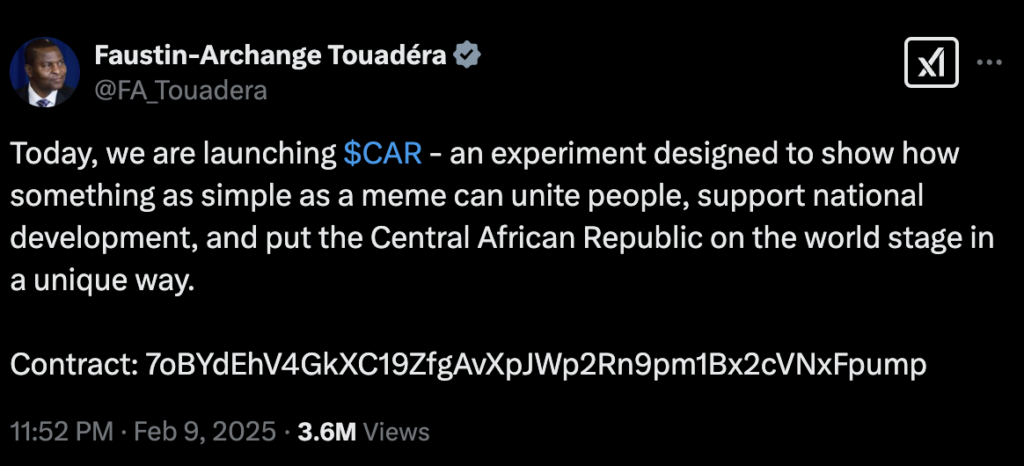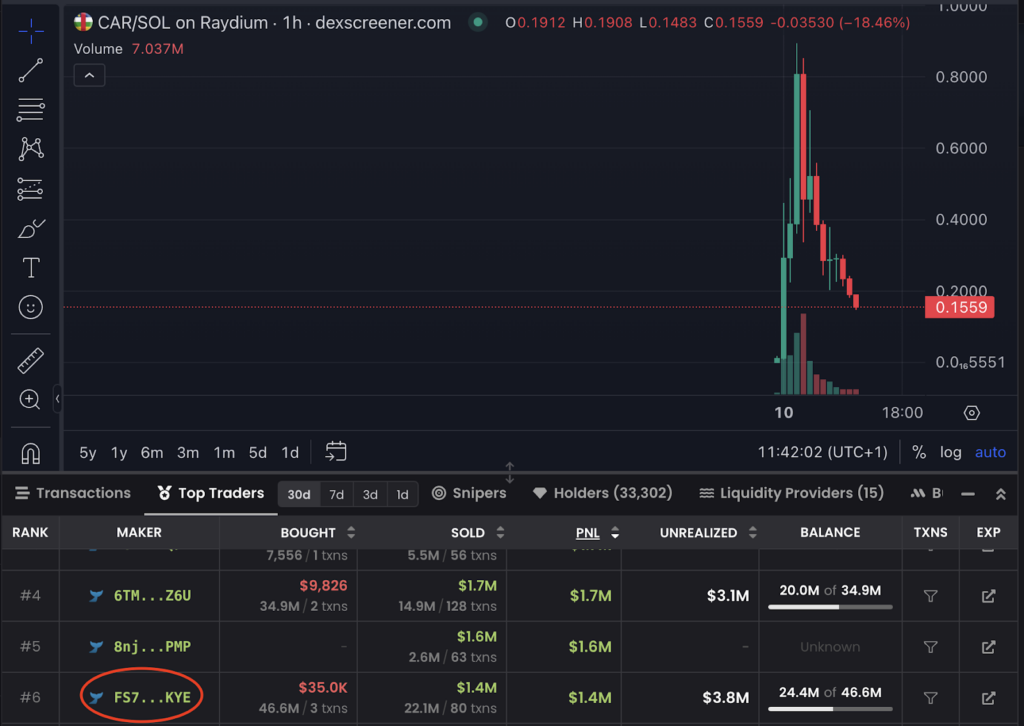
Yesterday, Faustin-Archange Touadéra, President of the Central African Republic, introduced the memecoin $CAR on X, inviting his followers to invest.
The token experienced a moderate initial success, briefly surpassing a capitalization of 500 million dollars just before crashing in a bear trend.
From on-chain analyses, it emerges that Touadéra allegedly purchased the memecoin immediately after the creation of the pool, and then sold part of the coin during the pump, cashing in about 1.5 million dollars at the expense of his followers.
Let’s delve deeper into the issue below.
The president of the Central African Republic launches the memecoin $CAR
Yesterday, the official X account of the President of the Central African Republic published a tweet announcing to the public the launch of the memecoin $CAR.
According to Faustin-Archange Touadéra, the new cryptocurrency represents a socio-economic experiment aimed at bringing more people together around a meme.
Immediately after the launch, the African politician reiterated his pro-crypto stance, emphasizing how new technologies can contribute to the development of his country.
In particular, he emphasized the role of the blockchain as a glue to promote community-driven initiatives.
Touadéra is known in the crypto world for having adopted Bitcoin as legal tender in the Central African Republic in 2022, following in the footsteps of El Salvador.
In a short time, the current President has attracted the attention of crypto speculators, bringing large trading volumes around CAR.
The memecoin even surpassed a capitalization of 500 million dollars, only to inexorably retrace its steps with a deep dump.
 Source: https://x.com/FA_Touadera/status/1888722674265764017
Source: https://x.com/FA_Touadera/status/1888722674265764017Initially, users showed skepticism towards Touadéra’s tweet, as the X account could have been hacked.
The AI models Seferbekov and Ensemble have indicated high probabilities of manipulation deepfake through the use of artificial intelligence, spreading suspicions of a scam.
However, two other models, including Avatrify and Deepware’s checker, did not show fraudulent elements, highlighting its legitimacy.
A few hours later the memecoin was confirmed as legitimate, although there were differing opinions on the nature of the coin.
The web hosting platform Namecheap immediately removed the official website of CAR, registered on the domain car.meme, labeling it as an “abusive service”.
In the midst of this confusion, X has suspended the account of CAR, while the President of the Central African Republic promptly stated that he is working to resolve the issue.
On-chain analyses show the presence of insider activity: the President of the Central African Republic cashes in 1.5 million dollars
Beyond the uncertainties about the genuineness of the memecoin CAR, we can state that in the first hours of trading, the President of the Central African Republic attracted significant positive traction.
Up to today, there have been exchanges for 600 million dollars, with a strong speculative component around the new product launched on the blockchain of Solana.
The on-chain analysis account X “Lookonchain” highlighted how a trader earned 12 million dollars by purchasing CAR immediately after Touadéra’s announcement.
In particular, the address in question spent 25 SOL to purchase 46.57 million CAR just one second after the contract address was posted on X by the President.
From there, the subject would have sold part of the coins initially purchased, capitalizing a profit of 1.67 million dollars, with a PNL of 10.5 million dollars.
Let’s talk about a crazy profit of 2450x.
Clearly, the trading activities just shown are nothing more than the result of market manipulation by insiders.
The politico della Repubblica Centrafricana is obviously the owner of the address that managed to purchase CAR in the instant following the publication of the tweet.
On Dexscreener we can easily notice how the same has purchased all 46.6 million CAR tokens with 3 txn, only to resell part of the loot in another 80 txn.
The indicated address still holds large amounts of the memecoin to liquidate, but it must sell little by little to avoid draining the liquidity of the pool.
It is possible that from now to the next few hours there will be a fake upward movement, aimed at attracting the last exit liquidity before the rug finale.
At the time of writing the article, the price of CAR continues to drop heavily downwards, with a typical “pump & dump” pattern.
 Source: https://dexscreener.com/solana/bx5pazbqbuyh5yt93xcoshdka6d6vz9azbddg7ze9syh
Source: https://dexscreener.com/solana/bx5pazbqbuyh5yt93xcoshdka6d6vz9azbddg7ze9syhAttention to memecoins launched by public figures: high risk of getting burned
The launch of the memecoin CAR by the President of the Central African Republic represents just another case in which a public figure scams their followers by proposing an investment that is nothing short of obscene.
Do you think that Touadéra with this somewhat dishonest move has pocketed as much as a resident of the Central African Republic earns on average in 189 years, considering an average annual salary of 7,900 dollars.
Potentially, the politician has attracted investments not only from the wealthy crypto community, but even from his own poor compatriots.
This phenomenon highlights an increasingly widespread problem in the world of cryptocurrencies: the use of memecoins by prominent figures to profit at the expense of less informed investors.
Memecoins are often seen as a risky bet, as their value can be extremely volatile and subject to market manipulations. The absence of adequate regulation makes it even more difficult for investors to protect themselves from fraud.
Furthermore, the involvement of public figures can give investors a false sense of security, leading them to believe that the investment is safe just because it is endorsed by an authority figure.
In recent months Andrew Tate, Jack Doherty, Jason Derulo, Haliey Welch, Sean Kingston, Donald Trump, Melania Trump, Kim Kardashian, Paris Hilton, and 50 Cent and many others have used their popularity to promote memecoins that turned out to be scams, causing significant losses to investors.
In most cases, when an influential person on social media launches a memecoin inviting investment, the only thing one should do is unfollow the profile and report for “scam”.

 7 months ago
40
7 months ago
40




 English (US) ·
English (US) ·